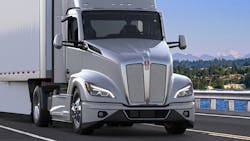Paccar CEO: We’re not seeing a North American slowdown
Those looking for a notable drop in 2024 North American truck sales won’t have much luck knocking on the door of Paccar CEO Preston Feight.
Speaking on a conference call Jan. 23 after Paccar reported its fourth-quarter profits, Feight said he and his team are sticking to their fall forecast that Class 8 sales in the U.S. and Canada will be between 260,000 and 300,000 this year. The midpoint of that range is about 6% below 2023’s final unit sales number of 297,000.
Paccar’s Kenworth and Peterbilt brands accounted for 109,000 of those trucks (versus 96,000 in 2022). Feight said demand is holding up, especially for vocational, less-than-truckload, and medium-duty vehicles.
“As far as a slowdown in orders, I'm not sure I can recognize that in our major North American markets,” Feight said. “We see good order intake and good visibility.”
Asked if significant emissions regulations changes planned for 2027 are pulling forward some sales to now, Feight told analysts that “might be a little much” but did add that such orders could begin to come in late this year or in 2025.
Paccar, headquartered in the Seattle area, produced fourth-quarter profits of more than $1.4 billion versus $921 million in late 2022. Sales of trucks and parts were $8.6 billion, up 11% year over year, while financial services revenue climbed more than 20% to $485 million, but its profitability fell because of higher interest costs.
See also: Cummins, Daimler, and Paccar detail massive battery plant plans
Those substantial numbers are helping Paccar maintain its investment pace: CFO Harrie Schippers told analysts he is projecting capital spending will grow to up to $750 million from last year’s $698 million, with chunks of cash earmarked for adding truck manufacturing capacity in Chillicothe, Ohio, as well as Mexico and for the construction an engine remanufacturing facility in Columbus, Mississippi. The battery cell factory announced this month by Paccar’s joint venture with Cummins and Daimler Truck also will get some capital.
On top of that, Feight said, Paccar could deploy some of its funds—it finished 2023 with $8.7 billion in cash and marketable securities on its books, up from $6.2 billion a year earlier—to buy competitors.
“We continue to make those evaluations at all times,” he said. “Having the cash gives us that flexibility to build an even more robust company as we move forward.”
Paccar shares (Ticker: PCAR) rallied on the Q4 report and commentary, rising more than 4% to $101 Jan. 23. The move extended a run that has seen them nearly double since late-summer 2022, growing the company’s market capitalization to almost $53 billion.
About the Author
Geert De Lombaerde
Senior Editor
A native of Belgium, Geert De Lombaerde has more than two decades of experience in business journalism. Since 2021, he has written about markets and economic trends for Endeavor Business Media publications FleetOwner, Healthcare Innovation, IndustryWeek, Oil & Gas Journal, and T&D World.
With a degree in journalism from the University of Missouri, he began his reporting career at the Business Courier in Cincinnati. He later was managing editor and editor of the Nashville Business Journal. Most recently, he oversaw the online and print products of the Nashville Post and reported primarily on Middle Tennessee’s finance sector and many of its publicly traded companies.

